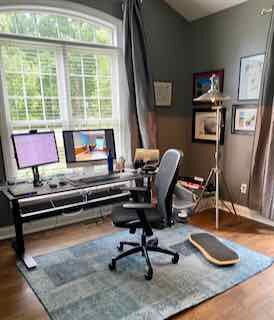Backpacking Out with the Old in with the New
I’m excited about backpacking. YouTube rekindled my interest. Getting back into backpacking or any hobby brings you to a decision; This can apply to any hobby or pursuit where you revive your interest, that decision point of old vs. new.
That line for me is, do I use the gear I have and potentially not enjoy the experience because of the outdated equipment or technology, or do I upgrade now. Am I settling, or is this a prudent approach?
Up the ladder, I went into the heat of my garage attic in search of the ole backpacking gear bin. Tucked away under the old hockey bags, I found it. Ducking down, so I didn’t headbutt the bare lightbulbs, I lugged the bin back to the ladder. Step one - I got my gear out of the attic.
Step two - discard the stuff that was moldy and unusable. Now I’m down to the gear that can be evaluated. Backpack – the old external frame pack didn’t fit and wasn’t going to work at all. – Upgrade.
Sleeping bag – keeper – it is a 35-degree bag and right now will work. The closed foam sleeping pad – I can try this out to see if my 58-year-old self can sleep on it as well as my 31-year-old self did. (Or didn’t know any better)!
What is the balance between using the old stuff vs. upgrading and getting hew? Is the focus on functionality, weight, safety?
Interesting question. So far, I have upgraded my pack, my sleeping pad, added a camp chair. I have not upgraded my stove, nor my sleeping bag, nor my tent. I will need to get a water filter as the old one is not usable.
What was good when I was younger is now arcane. There is a balance between using what I must see if I like it and not enjoying it because what I have is not usable or making it not enjoyable. My tent is 7.4 lbs. Will upgrading my tent make the experience that much better? Or should I suck it up and go with the tent to see how I like it?
Interesting debate.
First, you need to prioritize, or at least define, what is success for you? Tackling the Teton’s is different from a night in the backyard or at Caesar’s Creek. What are your goals for the outing? I can suck up the weight and discomfort to see if I need to upgrade. Also, you need to clearly define what is critical to what you are doing? The backpacking big 3 Sleeping System, Shelter, and pack are key. Also, there are must have’s that you must invest in.
Water filter, stove, etc., that are a non-starter. The higher-priced items can be upgraded later. I slept a night in the backyard on the old, closed foam celled sleeping pad – that was upgraded!! I need a safe, effective water filtration system, so that is a must before I head outside of the backyard. The tent, wait, the pack was upgraded – picture of Packs. Be careful what is considered essential or must-haves that were not even around when you started the hobby. Maps vs. GPS??
What do you think?
You Need to Be An Infinite Player
Infinite players change, pivot, and adjust more successfully than finite players.
You need to be an infinite player.
Let’s get the definitions straight – What is an infinite player? - An infinite player’s outlook is towards value creation and contributions that span generations. Infinite players don’t view the game as life-ending but just evolving and improving. Life provides them with the ability and opportunity to provide lasting value. – a long-term view, that by definition, you embrace change, evolving and such that the “game lives on” beyond you and there is not an end game win. They typically embrace just causes and think broadly. The goal of the infinite player is to evolve, grow, stay in the game, innovate.
Contrast that with the finite thinker. They are more of a short-term winner vs. losers, see the end of the game as either winning or losing. An example of a good sport would be American Football. There is a specific time for the game, and at the end, the higher score wins. Game over.
Life isn’t like that.
Change is inevitable and needed to survive and contribute. Having an infinite mindset is critical. Being an infinite player with a long-term view towards value creation and contribution allows you to:
Change quickly as you don’t have to wait for the perfect moment. If timing is off, the short-term implications are minimized over time.
Not be concerned with perfection. You’re not paralyzed by waiting for the perfect time. You can take action because you know any short-term bumps don’t matter in the long term. You can take action. Ship the minimum viable product and iterate from there. You have a vision of what you want to contribute, which is just a point on that continuum.
Focus on easy, small wins. As Jeff Walker says, you can focus on “Getting to the First Dollar”. You can take the focused steps need to prove your concept and ultimate value to the customer.
You can address issues as they come up, and you feel like you are in control of what is transpiring. You don’t let things happen because of fate; you take action. You improve. Don’t assume anything; take action.
Have greater control over your actions than your results. You focus on what you can control and not on the score or outcome.
Be a process and systems thinker. You work a process rather than jumping around trying to get quick results. You take advantage of systems thinking because a successful system creates insight and new ideas. As Jim Afremow in The Champion’s Mind put it, “Always focus on the process and execution rather than worrying about the desired, or worse, the feared result, whether you are staring down a putt on the 18th green to win a tournament or to break 80 for the first time.”
Ask great questions like James Clear proposed “If you keep living the way you are, what will your life look like in 20 years?”
Be decisive. Sometimes you need patience other times; you need to take action. You’ll know when.
Understand the value of small changes because you are in it for the long haul. You know the importance of small incremental change and have the vision and time to see the returns. Remember saving 10 minutes a day = 1 week of effort and time within a year. Small changes add up.
Take a more measured approach to change. You have time to go through the 5 steps Hugh Culver outlines as key to successful change in your life:
Become crystal clear about the challenge,
Determine the best possible solution,
Adopt a belief that you will succeed,
Take action and pay attention to evidence of your success, and
Repeat.
Take advantage of valuable feedback loops. Feedback loops are vital components to drive and inform change. You take advantage of more feedback loops. Better information can lead to better and more meaningful change. Feedback is the key to change and to learn.
Be motivated by sustained impact. Your answer to a higher calling. You don’t need a massive, quick change to remain motivated. The key is sustained change, not quick change for a dopamine hit. The old 1% change adage.
Take advantage of the momentum from minor changes. They become habitual and routine. Change to improve.
Be an infinite player and embrace change and improvement. Your focus on the long-term allows you to ride out short-term bumps and deviations. It is easier to put these changes in perspective. You will be able to change, adjustment and to pivot easier. You can do it. This will lead to less mental and physical stress in your life.
Have a more meaningful life by moving towards infinite thinking.
Time for all of us to make a change
Pencils Pencils Pencils
Hundreds of pencils and a six-inch stack of paper were both staring back at me. I had accumulated a lot of stuff in my office. March 2020, I went home to work. COVID created a new work from home reality. I had to let my work office invade my home office without putting up any fight. I just needed to get to work.
Fast forward six months and most of the world is still working remotely, including me. The honeymoon phase is over, and it is turning into a grind. Add to this the family stress and uncertainty on if my son is going back to school or learning virtually. We both needed a change. On top of that, the days are all running together. My son is always asking, what day is it.
I am fortunate in that I have a few empty bedrooms and an office that my son and I can use as either bedrooms or offices. He had moved into my office as his bedroom, and I took over one of the bedrooms as command central of John Hayes Inc. We both need a change.
Old home office
My designated office was filled with essentials and other office type stuff, and it was time to do something about all of it. My son and I agreed that a change of location was necessary. I didn't realize how much this change of location or state, was going to improve my mood, energy level, organization and purging, and motivation. This change of state/location jump-started a marked level of improvement for my son and me.
Packing up and moving everything out of my office was the trigger I needed for change. I was able to purge all the unnecessary stuff I had accumulated; manuals, papers, office supplies (enough staples for all of the 21st century, and wow the binder clips). I was able to move the cool table I was using as a desk to the basement and purchase a new adjustable standing desk. I moved the keepsakes I was storing into a keepsake bid and stored it out of my office.
I took the time to decide what was necessary, what was just stuff I had accumulated for " I might need it someday" and, even what artwork I wanted on the walls. On top of that, I had all the stuff I brought home from my late mother's home that was packed in the closet—no closet in my new office. I needed to balance between keepsakes and what was critical to my home/work office. Time to decide; what do I use daily, what can be stored, and what needs to go.
In my work office over time, my workspace evolved into what I needed to be effective; small tweaks and changes helped optimized the office into what worked. It was a single purpose, just what I needed to work effectively, nothing more. I needed that same focus with my home office. The office in my home needed a single purpose: what I needed to be effective.
New home office
Time to change your state. Only you control how you are reacting to the world these days. This means you control improving your mood, energy level, motivation, no one else. No matter how small or constraining your workspace, it is time to change. Organize differently, move the work table to a different area of the room, do something that requires you to review each item, consciously decide on keep vs. toss and change it up. Making this seemingly small change will improve your mood, energy, and motivation. This is going to last way longer than we thought. - Control what you can control and improve your state. Oh, and I found a place for all those pencils. They live another day.



